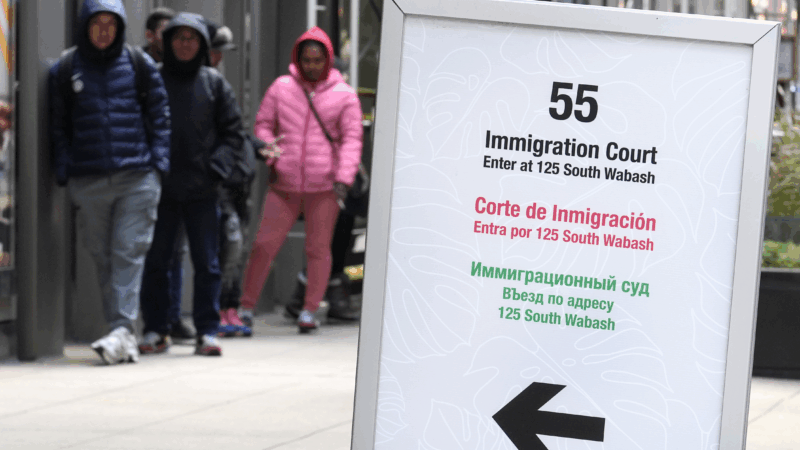Immigrants in the US illegally fight the Trump administration’s new no-bail policy
A class action lawsuit has been filed challenging the Trump administration’s new policy requiring immigrants illegally in the U.S. who are arrested by Immigration and Customs Enforcement to remain in detention while fighting their deportation. It’s an abrupt reversal of long-standing practice of allowing individuals who are deemed not a flight risk or a public safety threat to be released on bail while their cases move through the immigration court system.
The new policy was outlined in an email to all ICE employees on July 8. The agency said it was using its “extraordinarily broad” authority to change its interpretation of existing law. As a result, even individuals who have been living and working in the U.S. for decades – with deep community ties – fall under the same law as those just recently caught entering illegally, and must remain locked up.
ICE officials say the policy aims to keep America safe by closing “loopholes” that allowed “millions of unvetted illegal aliens” to be released into communities, according to Department of Homeland Security spokesperson Tricia McLaughlin.
But advocates for migrants are asking a federal court in California to block it.
“It’s a misinterpretation of the law,” says Matt Adams, legal director for the Northwest Immigrant Rights Project, one of several groups bringing the class-action lawsuit against the Trump administration. “The statute makes clear that they are entitled to a bond hearing [but] now the agencies are attempting to rewrite the law … and they’re adopting this draconian interpretation.”
Immigration lawyers say the new policy is causing ‘catastrophic’ harm
The lawsuit will be filed against top Trump administration officials including DHS Secretary Kristi Noem and Attorney General Pam Bondi. It also targets the immigration court in Adelanto, Cal., where the administration’s policy has been implemented and bond hearings are routinely being denied.
Adams calls the policy change “arbitrary and capricious” and a violation of immigrants’ due process rights. He says it is already causing “catastrophic” and “irreparable harm” to as many as tens of thousands of noncitizens and their families, as they could end up spending months or years in detention before their cases are resolved.
Ana Franco Galdamez is one of the named plaintiffs. A single mother who’s been in the U.S. for more than 20 years, she is the sole provider for her two children who are U.S. citizens, and recently completed treatment for breast cancer. Since being arrested and detained after a large immigration raid in Los Angeles, she has already “missed an important follow up mammogram” according to the complaint.
Others included in the proposed class action include a 65-year-old father and sole provider for three U.S.citizen children who all have severe cognitive disabilities, as well as a father of three who has a seven-month old who was recently hospitalized. All have strong ties to the community, their lawyers say, no criminal past, and do not present a flight risk or danger to others.
“They’re deprived of their liberty, separated from their families, separated from their homes, and from their jobs,” Adams says. “The impact is not only on [them] but also on [their] children who are so dependent upon [them].”
Earlier this year, Adams filed a similar class action suit in Tacoma, Washington, after immigration judges there had been denying bail for years, using a legal reasoning similar to the Trump administration’s approach. That case includes a woman who has lived in Washington state for nearly two decades and has six U.S. citizen children, including a seven-year-old with terminal cancer. A federal judge recently issued a preliminary injunction in that case, finding it was likely to succeed.
‘Like a sleight-of-hand trick’
When the Trump administration declared its nationwide policy about-face in July, immigration lawyers say they were blindsided. Many only learned of the change when bail requests that had been routinely granted for decades were suddenly denied across the board.
“I was absolutely shocked. It’s like they flipped their understanding of the statute on its head.” says Nico Thompson-Lleras, a defense attorney with the Coalition for Humane Immigrant Rights, recalling his bond request for a client in California just days after the administration’s complete turnaround. “It was almost like a slight-of-hand trick.”
Thompson-Lleras says his client, Ananias Pasqual, would have been a shoo-in for a release on bond in the past. He’s a 40-something father of four U.S. citizens, who’s been working and paying taxes for decades, with no criminal record, and is not a flight risk, Thompson-Lleras says. He came to court with 85 pages of evidence to prove it.
“But we didn’t even get to the case,” Thompson-Leras says. “It was cut off at the knees. The government’s attorney laid out this argument that we had never heard before, and before we knew it, bond was denied, and we sort of walked out in a daze.”
Pasqual is one of a growing number of attorneys around the nation challenging the new policy with habeas corpus claims in federal court, arguing they were unlawfully detained, and denied their due process rights. A group claim, including Pasqual, will also be part of the class action lawsuit.
“It’s like going over the head of the immigration courts. Basically, we’re trying everything we can do, I mean, any conceivable strategy,” Thompson-Lleras says.
Unlike criminal and civil court courts, immigration judges fall under the executive branch. They’ve been under increasing pressure to fall in line with the Trump administration’s hardline immigration stance. Six months in, that includes a massive expansion of arrests, detention and deportations of people in the US without legal status.
DHS officials did not respond to requests for comment specifically on the legal challenges, but DHS spokeswoman McLaughlin offered, “Politicians and activists can cry wolf all they want, but it won’t deter this administration from keeping these criminals and lawbreakers off American streets…”
Congress could step in and clarify or change the bond law, legal experts say, but short of that, the lawsuits to block the administration’s new policy are likely to continue all the way up to the U.S. Supreme Court.
Former immigration judge Andrew Arthur, now a fellow with the Center for Immigration Studies, which favors strict immigration limits and enforcement, hopes the administration’s interpretation will prevail.
“The reason for the law is to ensure that those individuals show up for immigration court – it’s safer for the community, it’s safer for the foreign national, it’s safer for the agents, – and cheaper,” Arthur says. In certain extreme cases, noncitizens can apply for parole on humanitarian grounds, which Arthur says is the proper pathway for individuals in the United States illegally.
But immigration lawyers say those requests haven’t been successful either.
Many in detention are deciding they’d rather give up their cases and leave
Already, many migrants stuck in detention are unwilling or unable to wait there while their case plays out in the courts.
“It’s really bad and unbearable just to stay there more,” says 25-year-old Alfredo “Lelo” Juarez Zeferino, who was picked up four months ago, denied bail, and held in ice detention in Tacoma. He says sleep is hard to come by in the facility, which he describes as packed and loud, with lights kept on all night, and fights frequently breaking out. He says the food is often under-cooked, and dinner is sometimes not served until the wee hours of the next morning.
The Geo Group, a private company that runs the detention facility, did not respond specifically to Juarez Zeferino’s complaints, but said in a statement to NPR, compliance with ICE standards is strictly monitored, and any problems are quickly resolved.
About a week ago, Juarez Zeferino decided he’d had enough. After 17 years in the U.S., he gave up, left two siblings who are U.S. citizens, and returned to Mexico.
“It was hard, but there wasn’t anything else I could do,” he told NPR from Mexico.
He also believes it is precisely the Trump administration’s goal.
“I truly do think that they want to make it as hard as they can, to make everybody get out,” he says. “They make it more difficult so people just leave.”
Trump is threatening to block a new bridge between Detroit and Canada from opening
President Donald Trump on Monday threatened to block the opening of a new Canadian-built bridge across the Detroit River, in his latest salvo over cross-border trade issues.
Ghislaine Maxwell appeals for clemency from Trump as she declines to answer questions
Maxwell declined to answer questions from House lawmakers on Monday, but indicated that if President Trump ended her sentence, she was willing to testify that neither he nor former President Clinton had done anything wrong in their connections with Epstein.
Lindsey Vonn says she suffered ‘complex tibia fracture’ in her Olympic downhill crash
The 41-year-old star said her torn ACL was not a factor in her crash. "While yesterday did not end the way I had hoped, and despite the intense physical pain it caused, I have no regrets," she wrote.
Guerilla Toss embrace the ‘weird’ on new album
On You're Weird Now, the band leans into difference with help from producer Stephen Malkmus.
Nancy Guthrie search enters its second week as a purported deadline looms
"This is very valuable to us, and we will pay," Savannah Guthrie said in a new video message, seeking to communicate with people who say they're holding her mother.
Immigration courts fast-track hearings for Somali asylum claims
Their lawyers fear the notices are merely the first step toward the removal without due process of Somali asylum applicants in the country.




